of和for的用法
- 格式:docx
- 大小:27.08 KB
- 文档页数:8
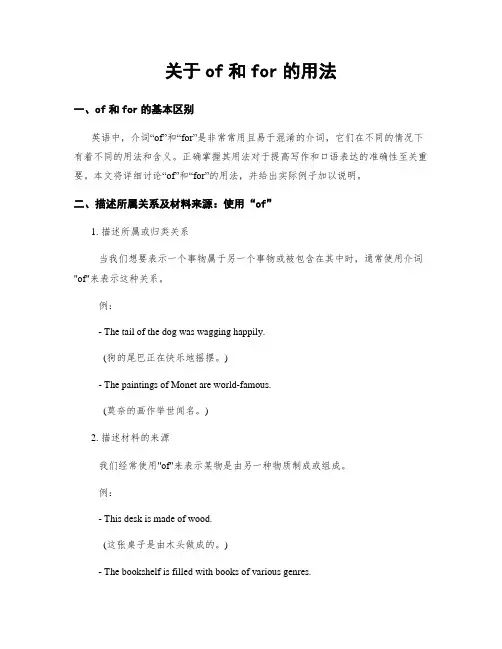
关于of和for的用法一、of和for的基本区别英语中,介词“of”和“for”是非常常用且易于混淆的介词,它们在不同的情况下有着不同的用法和含义。
正确掌握其用法对于提高写作和口语表达的准确性至关重要。
本文将详细讨论“of”和“for”的用法,并给出实际例子加以说明。
二、描述所属关系及材料来源:使用“of”1. 描述所属或归类关系当我们想要表示一个事物属于另一个事物或被包含在其中时,通常使用介词"of"来表示这种关系。
例:- The tail of the dog was wagging happily.(狗的尾巴正在快乐地摇摆。
)- The paintings of Monet are world-famous.(莫奈的画作举世闻名。
)2. 描述材料的来源我们经常使用"of"来表示某物是由另一种物质制成或组成。
例:- This desk is made of wood.(这张桌子是由木头做成的。
)- The bookshelf is filled with books of various genres.(书架上堆满了各种类型的书籍。
)三、表示目标、目的和适用范围:使用“for”1. 表示目标和目的当我们想要表达某种行为或事物是为了达到特定目标或目的时,我们通常使用介词"for"。
例:- I bought a new laptop for work.(我买了一台新笔记本电脑用于工作。
)- This medicine is for curing headaches.(这种药是治头痛用的。
)2. 描述适用范围或对象"for" 还可以用来表示某个行动、评论或建议适用于特定对象。
例:- This book is for children aged 8-12.(这本书适合8至12岁的儿童。
)- Please write a report for the meeting tomorrow.(请写一份明天会议需要的报告。
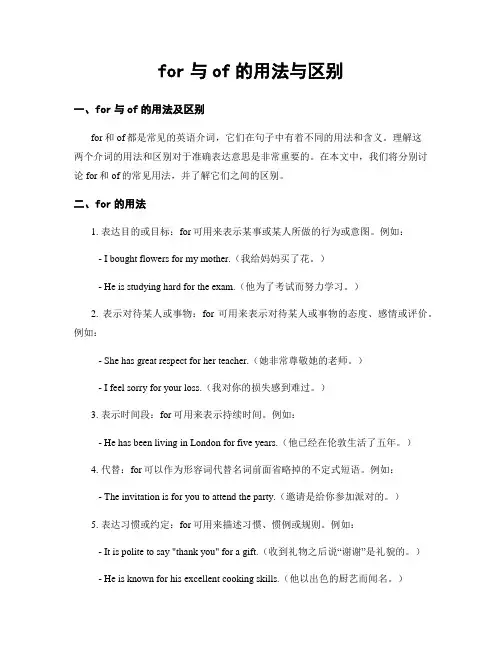
for与of的用法与区别一、for与of的用法及区别for和of都是常见的英语介词,它们在句子中有着不同的用法和含义。
理解这两个介词的用法和区别对于准确表达意思是非常重要的。
在本文中,我们将分别讨论for和of的常见用法,并了解它们之间的区别。
二、for的用法1. 表达目的或目标:for可用来表示某事或某人所做的行为或意图。
例如:- I bought flowers for my mother.(我给妈妈买了花。
)- He is studying hard for the exam.(他为了考试而努力学习。
)2. 表示对待某人或事物:for可用来表示对待某人或事物的态度、感情或评价。
例如:- She has great respect for her teacher.(她非常尊敬她的老师。
)- I feel sorry for your loss.(我对你的损失感到难过。
)3. 表示时间段:for可用来表示持续时间。
例如:- He has been living in London for five years.(他已经在伦敦生活了五年。
)4. 代替:for可以作为形容词代替名词前面省略掉的不定式短语。
例如:- The invitation is for you to attend the party.(邀请是给你参加派对的。
)5. 表达习惯或约定:for可用来描述习惯、惯例或规则。
例如:- It is polite to say "thank you" for a gift.(收到礼物之后说“谢谢”是礼貌的。
)- He is known for his excellent cooking skills.(他以出色的厨艺而闻名。
)6. 表示代价或成本:for可用来表示某人为获得某物而支付的价值或成本。
例如:- I bought this book for $20.(我花了20美元买这本书。
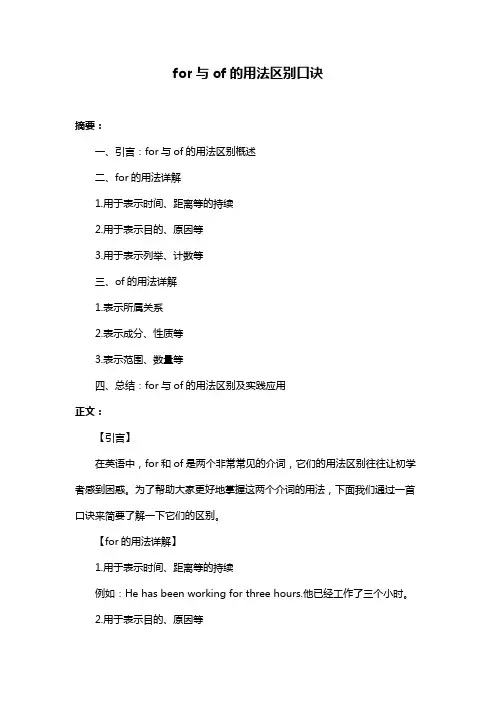
for与of的用法区别口诀摘要:一、引言:for与of的用法区别概述二、for的用法详解1.用于表示时间、距离等的持续2.用于表示目的、原因等3.用于表示列举、计数等三、of的用法详解1.表示所属关系2.表示成分、性质等3.表示范围、数量等四、总结:for与of的用法区别及实践应用正文:【引言】在英语中,for和of是两个非常常见的介词,它们的用法区别往往让初学者感到困惑。
为了帮助大家更好地掌握这两个介词的用法,下面我们通过一首口诀来简要了解一下它们的区别。
【for的用法详解】1.用于表示时间、距离等的持续例如:He has been working for three hours.他已经工作了三个小时。
2.用于表示目的、原因等例如:I came here for you.我来这里是找你的。
3.用于表示列举、计数等例如:She bought apples, oranges, and bananas for her family.她为家人买了苹果、橙子和香蕉。
【of的用法详解】1.表示所属关系例如:The book of John.约翰的书。
2.表示成分、性质等例如:The window of the room.这个房间的窗户。
3.表示范围、数量等例如:Five of the students passed the test.五个学生通过了测试。
【总结:for与of的用法区别及实践应用】通过以上讲解,我们可以总结出for和of的用法区别:- for主要用于表示时间、目的、原因、列举等;- of主要用于表示所属关系、成分、性质、范围等。
在实际应用中,我们要根据语境选择合适的介词,避免使用错误。
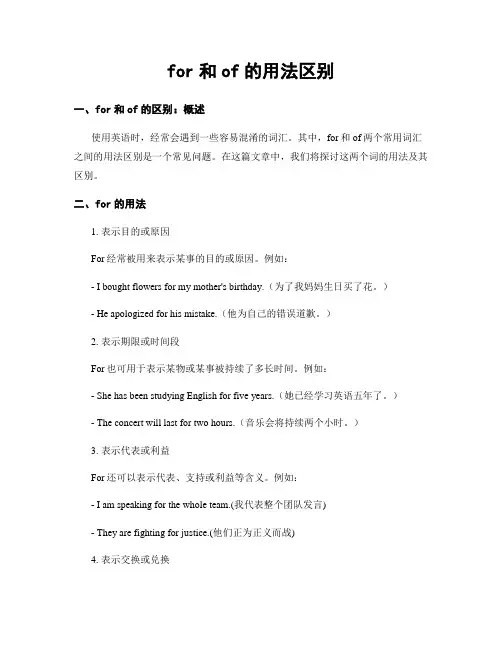
for和of的用法区别一、for和of的区别:概述使用英语时,经常会遇到一些容易混淆的词汇。
其中,for和of两个常用词汇之间的用法区别是一个常见问题。
在这篇文章中,我们将探讨这两个词的用法及其区别。
二、for的用法1. 表示目的或原因For经常被用来表示某事的目的或原因。
例如:- I bought flowers for my mother's birthday.(为了我妈妈生日买了花。
)- He apologized for his mistake.(他为自己的错误道歉。
)2. 表示期限或时间段For也可用于表示某物或某事被持续了多长时间。
例如:- She has been studying English for five years.(她已经学习英语五年了。
)- The concert will last for two hours.(音乐会将持续两个小时。
)3. 表示代表或利益For还可以表示代表、支持或利益等含义。
例如:- I am speaking for the whole team.(我代表整个团队发言)- They are fighting for justice.(他们正为正义而战)4. 表示交换或兑换For有时还表示交换或兑换关系。
例如:- I'll give you my book for your pen.(我会用我的书来交换你的笔)- She traded her old car for a new one.(她用一辆新车折换了旧车)三、of的用法1. 表示所属关系或具体性质Of经常用来表示所属关系或某物的具体性质。
例如:- The book of John is on the table.(约翰的书在桌子上。
)- This is a picture of my family.(这是一张我家人的照片。
)2. 表示来源或原因Of也可表示某事物的来源或原因。
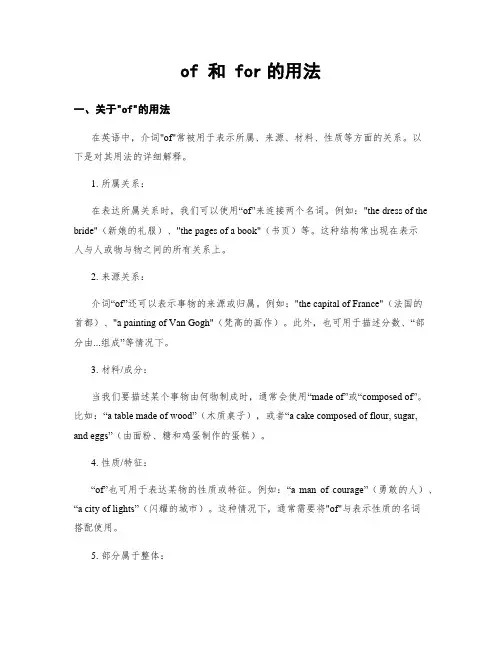
of 和 for的用法一、关于"of"的用法在英语中,介词"of"常被用于表示所属、来源、材料、性质等方面的关系。
以下是对其用法的详细解释。
1. 所属关系:在表达所属关系时,我们可以使用“of”来连接两个名词。
例如:"the dress of the bride"(新娘的礼服)、"the pages of a book"(书页)等。
这种结构常出现在表示人与人或物与物之间的所有关系上。
2. 来源关系:介词“of”还可以表示事物的来源或归属。
例如:"the capital of France"(法国的首都)、"a painting of Van Gogh"(梵高的画作)。
此外,也可用于描述分数、“部分由...组成”等情况下。
3. 材料/成分:当我们要描述某个事物由何物制成时,通常会使用“made of”或“composed of”。
比如:“a table made of wood”(木质桌子),或者“a cake composed of flour, sugar, and eggs”(由面粉、糖和鸡蛋制作的蛋糕)。
4. 性质/特征:“of”也可用于表达某物的性质或特征。
例如:“a man of courage”(勇敢的人)、“a city of lights”(闪耀的城市)。
这种情况下,通常需要将"of"与表示性质的名词搭配使用。
5. 部分属于整体:当我们想要表达某物是整体的一部分时,可以使用“part of”。
比如:“the heart is part of the human body”(心脏是人体的一部分)。
二、关于"for"的用法介词"for"有多种用途,包括目的、目标、原因等。
现在让我们对其进行详细探讨。
1. 目的/原因:使用介词“for”来表示行动或目标。
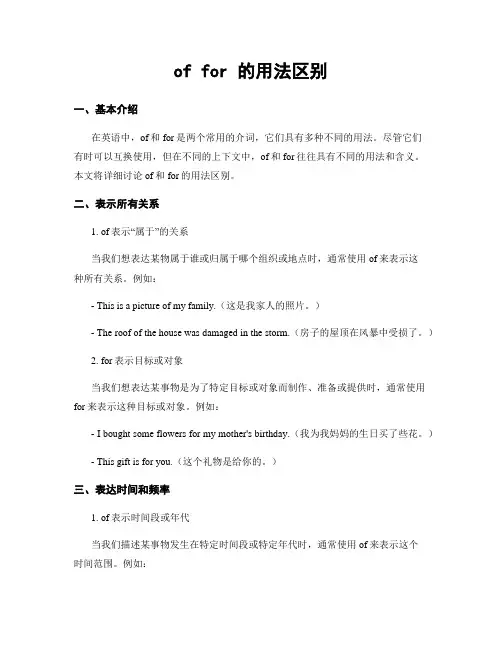
of for 的用法区别一、基本介绍在英语中,of和for是两个常用的介词,它们具有多种不同的用法。
尽管它们有时可以互换使用,但在不同的上下文中,of和for往往具有不同的用法和含义。
本文将详细讨论of和for的用法区别。
二、表示所有关系1. of表示“属于”的关系当我们想表达某物属于谁或归属于哪个组织或地点时,通常使用of来表示这种所有关系。
例如:- This is a picture of my family.(这是我家人的照片。
)- The roof of the house was damaged in the storm.(房子的屋顶在风暴中受损了。
)2. for表示目标或对象当我们想表达某事物是为了特定目标或对象而制作、准备或提供时,通常使用for来表示这种目标或对象。
例如:- I bought some flowers for my mother's birthday.(我为我妈妈的生日买了些花。
)- This gift is for you.(这个礼物是给你的。
)三、表达时间和频率1. of表示时间段或年代当我们描述某事物发生在特定时间段或特定年代时,通常使用of来表示这个时间范围。
例如:- The war broke out in the early years of the 20th century.(战争在20世纪初爆发。
)- I haven't seen him since the beginning of last month.(自从上个月初以来我就没见过他了。
)2. for表示持续时间当我们想表达某事物发生的持续时间时,通常使用for来表示这段时间。
例如:- She has been working here for five years.(她在这里工作已经五年了。
)- We waited for two hours before the show started.(演出开始前,我们等待了两个小时。
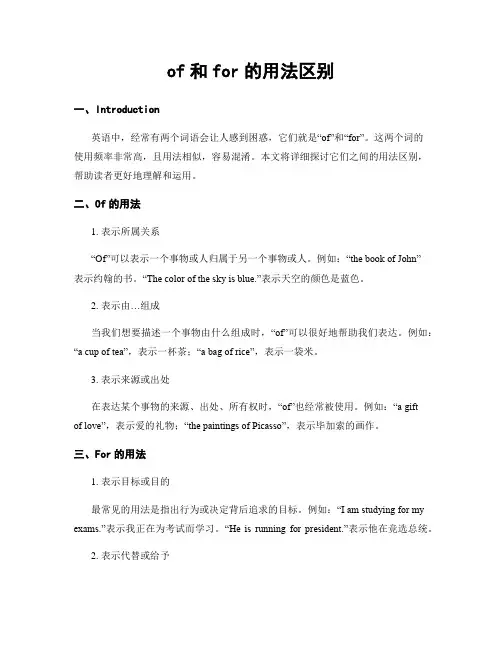
of和for的用法区别一、Introduction英语中,经常有两个词语会让人感到困惑,它们就是“of”和“for”。
这两个词的使用频率非常高,且用法相似,容易混淆。
本文将详细探讨它们之间的用法区别,帮助读者更好地理解和运用。
二、Of的用法1. 表示所属关系“Of”可以表示一个事物或人归属于另一个事物或人。
例如:“the book of John”表示约翰的书。
“The color of the sky is blue.”表示天空的颜色是蓝色。
2. 表示由…组成当我们想要描述一个事物由什么组成时,“of”可以很好地帮助我们表达。
例如:“a cup of tea”,表示一杯茶;“a bag of rice”,表示一袋米。
3. 表示来源或出处在表达某个事物的来源、出处、所有权时,“of”也经常被使用。
例如:“a giftof love”,表示爱的礼物;“the paintings of Picasso”,表示毕加索的画作。
三、For的用法1. 表示目标或目的最常见的用法是指出行为或决定背后追求的目标。
例如:“I am studying for my exa ms.”表示我正在为考试而学习。
“He is running for president.”表示他在竞选总统。
2. 表示代替或给予“for”也可以表示替代某人做事,或为某人提供帮助、赠送物品等。
例如:“She cooked dinner for her family.”表示她为家人做晚饭。
“I bought a gift for my friend.”表示我给朋友买了份礼物。
3. 表示对待或感觉有时,“for”可以表示对待某人或某事的态度、感受。
例如:“He is famous for his ge nerosity.”表示他以慷慨著称。
“I feel sorry for him.”表示我为他感到难过。
四、Of和For的区别1. 所属关系 vs. 目标/目的“of”表达两个事物之间的所属关系,而“for”则强调行动背后的目标或目的。
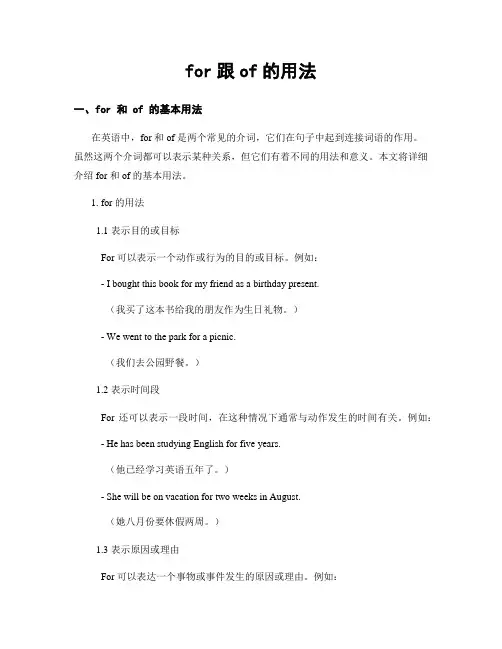
for跟of的用法一、for 和 of 的基本用法在英语中,for 和 of 是两个常见的介词,它们在句子中起到连接词语的作用。
虽然这两个介词都可以表示某种关系,但它们有着不同的用法和意义。
本文将详细介绍 for 和 of 的基本用法。
1. for 的用法1.1 表示目的或目标For 可以表示一个动作或行为的目的或目标。
例如:- I bought this book for my friend as a birthday present.(我买了这本书给我的朋友作为生日礼物。
)- We went to the park for a picnic.(我们去公园野餐。
)1.2 表示时间段For 还可以表示一段时间,在这种情况下通常与动作发生的时间有关。
例如: - He has been studying English for five years.(他已经学习英语五年了。
)- She will be on vacation for two weeks in August.(她八月份要休假两周。
)1.3 表示原因或理由For 可以表达一个事物或事件发生的原因或理由。
例如:- I apologized to her for my mistake.(我为我的错误向她道歉。
)- He was praised by his boss for his hard work.(他因为努力工作而受到老板的表扬。
)2. of 的用法2.1 表示归属关系Of 可以表示一种所有关系,表达一个事物属于另一个事物。
例如: - The tail of the dog is wagging.(狗的尾巴在摇动。
)- The color of her dress is blue.(她衣服的颜色是蓝色的。
)2.2 表示材料、来源或成分Of 还可以表示某物的材料、来源或构成部分。
例如:- This table is made of wood.(这张桌子是由木头做成的。
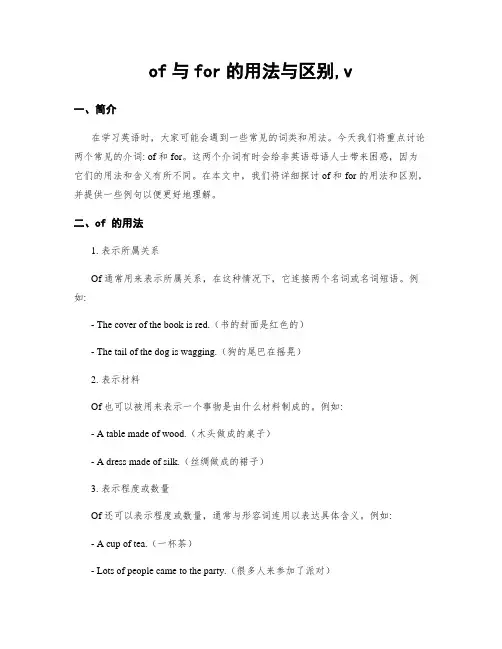
of与for的用法与区别,v一、简介在学习英语时,大家可能会遇到一些常见的词类和用法。
今天我们将重点讨论两个常见的介词: of 和 for。
这两个介词有时会给非英语母语人士带来困惑,因为它们的用法和含义有所不同。
在本文中,我们将详细探讨 of 和 for 的用法和区别,并提供一些例句以便更好地理解。
二、of 的用法1. 表示所属关系Of 通常用来表示所属关系,在这种情况下,它连接两个名词或名词短语。
例如:- The cover of the book is red.(书的封面是红色的)- The tail of the dog is wagging.(狗的尾巴在摇晃)2. 表示材料Of 也可以被用来表示一个事物是由什么材料制成的。
例如:- A table made of wood.(木头做成的桌子)- A dress made of silk.(丝绸做成的裙子)3. 表示程度或数量Of 还可以表示程度或数量,通常与形容词连用以表达具体含义。
例如:- A cup of tea.(一杯茶)- Lots of people came to the party.(很多人来参加了派对)4. 表示时间Of 可以和某些时间词连用,表示一段时间。
例如:- The start of the race is at 9am.(比赛的开始时间是上午9点)- I usually go to bed at the end of the day.(我通常在一天结束时上床睡觉)三、for 的用法1. 表示目的或目标For 用于表示一个行为的目的或目标。
例如:- I bought flowers for my mother.(我给我妈妈买了花)- He is studying hard for his exams.(他正在为他的考试努力学习)2. 表示代替For 还可用来表示代替或取而代之的概念。
例如:- Can you sing a song for me?(你能给我唱一首歌吗?)- I'll do your homework for you.(我会帮你做作业)3. 表示时间段For 可与一些具体的时间段连用,表示一个动作或状态持续多长时间。
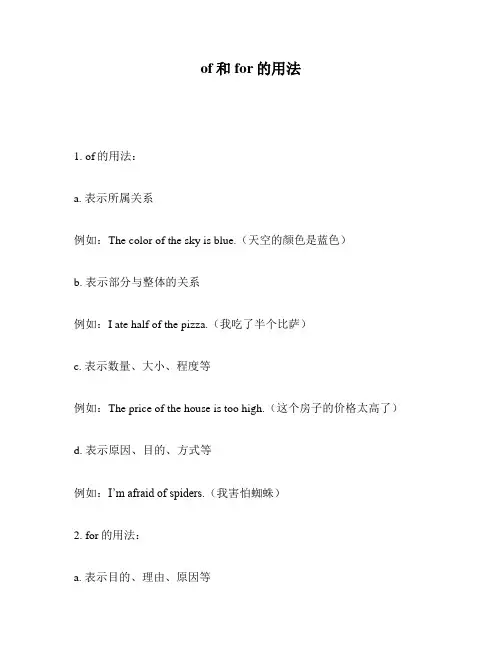
of和for的用法
1. of的用法:
a. 表示所属关系
例如:The color of the sky is blue.(天空的颜色是蓝色)
b. 表示部分与整体的关系
例如:I ate half of the pizza.(我吃了半个比萨)
c. 表示数量、大小、程度等
例如:The price of the house is too high.(这个房子的价格太高了)d. 表示原因、目的、方式等
例如:I’m afraid of spiders.(我害怕蜘蛛)
2. for的用法:
a. 表示目的、理由、原因等
例如:I bought this book for my sister.(我为我妹妹买了这本书)
b. 表示时间、期限等
例如:I’ll be away for two weeks.(我将缺席两个星期)
c. 表示代替、代表等
例如:I’m here for Jim.(我来代表吉姆)
d. 表示支持、帮助等
例如:I’m here for you if you need my help.(如果你需要帮助,我会在这里帮助你)
总结:
of表示所属、部分与整体、数量、大小、程度、原因、目的等,而for 表示目的、理由、时间、代替、支持等。
两者有重叠的地方,但在大多数情况下,它们在语法和语义上有不同的使用。
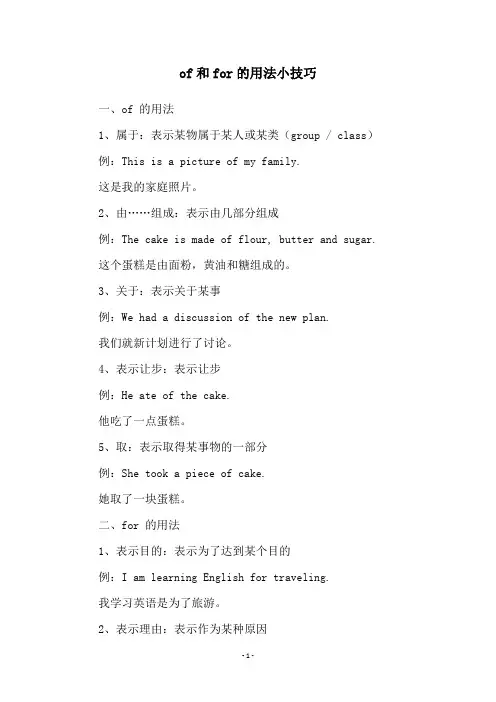
of和for的用法小技巧一、of 的用法1、属于:表示某物属于某人或某类(group / class)例:This is a picture of my family.这是我的家庭照片。
2、由……组成:表示由几部分组成例:The cake is made of flour, butter and sugar.这个蛋糕是由面粉,黄油和糖组成的。
3、关于:表示关于某事例:We had a discussion of the new plan.我们就新计划进行了讨论。
4、表示让步:表示让步例:He ate of the cake.他吃了一点蛋糕。
5、取:表示取得某事物的一部分例:She took a piece of cake.她取了一块蛋糕。
二、for 的用法1、表示目的:表示为了达到某个目的例:I am learning English for traveling.我学习英语是为了旅游。
2、表示理由:表示作为某种原因例:He was late for traffic.他迟到是因为交通问题。
3、表示时间:表示某段时间,可以表示一小段时间或一段较长的时间例:They will stay here for two weeks.他们将在这里停留两周。
4、表示替代:表示替代或交换例:I will give you five dollars for your pencil.我给你五美元换你的铅笔。
5、表示关系:表示两者之间的关系例:He is my friend for five years.他是我五年的朋友。
for跟of的用法区别一、基本用法区别在英语中,"for"和"of"都是常用的介词,但它们在用法上有着不同的特点和意义。
1. "for" 的用法:"for"通常表示目的、原因、作用或意图等含义。
例如:- I bought a gift for my friend.(我给朋友买了一份礼物。
)- I am studying English for better job opportunities.(我正在学习英语以获得更好的工作机会。
)- He apologized for his mistakes.(他为自己的错误道歉。
)除此之外, "for"还可以表达以下含义:- 表示持续时间:He has been waiting for an hour. (他已经等了一个小时了。
)- 表示比例或相似性:The exchange rate is 1 dollar for 7 yuan. (汇率是1美元兑换7元人民币。
)- 表示付款人:I will pay for the dinner tonight. (今晚的晚餐我来付钱。
)2. "of" 的用法:/of通常表示所属关系、材料构成、起源等意思。
例如:- The cover of the book is blue. (这本书的封面是蓝色的。
)- The key to success is hard work. (成功的关键是努力工作。
)- A cup of tea, please.(请来一杯茶)此外,“of” 还可以表示以下意思:- 用于表示某物的特征或属性:a box of chocolates(一盒巧克力)- 表示人与物的关系:a friend of mine(我的一个朋友)二、常见搭配及例句1. "for" 的常见搭配:- for the sake of:为了...起见- He worked hard for the sake of his family's happiness. (他为了家人的幸福而努力工作。
of与for的用法以及区别一、介词"of"的用法及区别1. 表示所属关系介词"of"常用来表示所属关系,连接两个名词或代词,后接所属的人或物。
例如:- The book of the teacher (老师的书)- The tail of the dog (狗的尾巴)2. 表示来源或出处介词"of"还可表示某事物的来源或出处。
例如:- A gift of love (爱的礼物)- The land of dreams (梦想之地)3. 表示组成部分介词"of"可以表示某事物由哪些部分组成。
例如:- A cup of tea (一杯茶)- A piece of cake (一块蛋糕)4. 表示内容、特征或性质介词"of"可以用来描述某事物的内容、特征或性质。
例如:- A box of chocolates (一盒巧克力)- A bag of rice (一袋米饭)二、介词 "for" 的用法及区别1. 表示目的或目标介词 "for" 常用来表示某事物的目的或目标。
例如:- I bought a gift for my friend's birthday. (我为我朋友的生日买了一个礼物)2. 表示代替关系介词 "for" 还可以表示代替某人或某事物的关系。
例如:- I'll cook dinner for you tonight. (今晚我会为你做饭)- She is substituting for her colleague while he is on vacation. (她在同事度假期间代替他工作)3. 表示支持、赞成或服务介词 "for" 还可以表示对某人的支持、赞成或提供服务的动作。
例如:- I'm voting for her because I believe in her abilities. (我会为她投票,因为我相信她的能力)- The doctor prescribed medication for the patient's condition. (医生为患者开了药方,治疗病情)4. 表示拥有关系介词 "for" 还可以表示某人拥有或享有某样东西。
of和for的用法和区别一、介绍在英语中,of和for是两个常用的介词。
虽然它们经常被混淆使用,但它们有着不同的意义和用法。
本文将详细讨论of和for的用法,并解释它们之间的区别。
二、of的用法1. 所有格(Possessive)当我们想表达某物属于或与某人有关时,我们可以使用of来表示所有关系。
例如:- The book belongs to John.(这本书是约翰的。
)- The tail of the dog is wagging.(狗的尾巴在摇摆。
)2. 来源(Origin)我们可以使用of介词表示某事物来自于或起源于某个地方。
例如:- The Eiffel Tower is a symbol of Paris. (艾菲尔铁塔是巴黎的象征。
)3. 构成材料(Composition)当我们想描述某物由什么材料制成时,可以使用of介词。
例如:- A table made of wood.(一个由木头做成的桌子。
)4. 性质或特性描述我们可以使用of来描述事物的属性、性质或特点。
例如:- A ball of fire shot across the sky.(一颗火球划过天空。
)5. 时间表达当我们需要表达具体时间或期限时,可以使用of作为介词。
例如:- The meeting is scheduled for the end of next week.(会议计划在下周末结束。
)三、for的用法1. 目的或目标(Purpose)当我们想表示某件事是为了达到特定目的或目标时,可以使用for介词。
例如:- I bought a cake for your birthday.(我为你的生日买了一个蛋糕。
)2. 表示代替有时候,我们可以使用for代替其他单词或短语以增强句子的连贯性。
例如:- He couldn't go, so I went for him.(他不能去,因此我代替他去了。
)3. 表示适合或适用当我们想要说明某物适合于某个人或情境时,可以使用for。
for和of的用法区别口诀一、引言:语法规则对于学习语言的人来说是至关重要的,它们为我们提供了正确使用单词和句子的指导。
在英语中,有很多常见的语法问题困扰着学习者,比如for和of的用法区别。
为了帮助大家更好地理解这个问题,本文将介绍并总结for和of在句子中的不同用法,并提供一个简单易记的口诀以帮助读者掌握这些规则。
二、for的用法:1. 表示目的或目标:for后面可接名词或动名词,表示某事物被用于特定目的。
例如:"I bought a gift for my sister."(我给我妹妹买了一份礼物。
)2. 表示时间段:for可以表达一段时间。
例如:"They have been married for 10 years."(他们已经结婚十年了。
)3. 表示代表或支持:for可以用来表示代表或支持某人或某事。
例如:"She voted for the new resolution."(她投票支持新决议。
)三、of 的用法:1. 所有权关系:表达物体所属关系时,通常使用of。
例如:"The cover of the book is torn."(书籍封面破损了。
)2. 来源关系:表示物体的来源或起源时,通常使用of。
例如:"He is a man of great wisdom."(他是一个极富智慧的人。
)3. 分离关系:of可以用来表示某人或某物被分离、取出或剥夺了一部分。
例如:"She drank a glass of milk."(她喝了一杯牛奶。
)四、for和of的区别口诀:为了帮助大家更好地记住for和of的用法区别,我总结了以下简单易记的口诀:"For表目标、时间段,意义明确有所参与;Of标所有、起源出,分解剥夺举例求;"按照这个口诀,我们可以很轻松地记住for和of在不同环境下的正确使用方式。
千里之行,始于足下。
of和for的用法of和for是英语中常用的介词,在不同的语境下有不同的用法。
下面是关于of和for的一些常见用法:1. of的用法:1.1 表示所属关系:of用来表达一种所属关系,即一个事物是属于另一个事物的一部分。
例句:The top of the mountain is covered in snow.(山顶被雪掩盖)1.2 表示材料或组成:of用来表示事物的组成或构成材料。
例句:This table is made of wood.(这张桌子是由木头制成的)1.3 表示产地或原产地:of可以表示事物的产地或原产地。
例句:This wine is from France.(这瓶酒来自法国)1.4 表示特性或属性:of用来描述某个事物的特性或属性。
例句:The sound of the music was beautiful.(音乐的声音很美)1.5 表示时间:of可以用来表示某个时间点或时间段。
例句:I will meet you at the end of the day.(我会在一天结束时见你)第1页/共3页锲而不舍,金石可镂。
1.6 表示目的或缘由:of可以表示某个行动的目的或缘由。
例句:I am here because of him.(我来这里是由于他)2. for的用法:2.1 表示目的或用途:for可以表示某个事物的目的或用途。
例句:I bought this book for studying English.(我买了这本书是为了学习英语)2.2 表示接受者:for可以表示某个行动的接受者。
例句:This gift is for you.(这个礼物是给你的)2.3 表示代替或替代:for可以表示代替或替代某个事物或行动。
例句:I will do your homework for you.(我会帮你完成作业)2.4 表示时间:for可以表示某个时间段。
例句:They have been waiting for hours.(他们已经等了几个小时了)2.5 表示对待或关怀:for可以表示对待或关怀某个人或事物。
for 和of的用法及区别一、引言(第一级标题)在英语中,介词是非常重要且常用的语法成分,而"for"和"of"则是其中使用频率较高的两个介词。
虽然它们看似相似,但实际上却有不同的用法和含义。
本文将详细探讨"for"和"of"的用法及区别。
二、"for"的用法(第二级标题)1. 表示目的(第三级标题)"For"可以表示某事或行动的目的。
例如:- He went to the supermarket for some groceries.(他去超市买些杂货。
)- We study hard for good grades.(为了取得好成绩,我们努力学习。
)2. 表示受益者(第三级标题)"For"也可表示某人从中获益或受到好处。
例如:- She cooked a delicious meal for her family.(她为家人做了一顿美味的饭菜。
)- The company organized a party for its employees.(公司为员工组织了一个聚会。
)3. 表示交换(第三级标题)"For"还可表示交换或替代关系。
例如:- I traded my old phone for a new one.(我用旧手机换了一个新手机。
)- They exchanged gifts for Christmas.(他们在圣诞节互赠礼物。
)4. 表示时间段(第三级标题)"For"还可以用于表示一段时间的长短。
例如: - She has been studying English for three years.(她已经学了三年英语了。
)- We will be on vacation for two weeks.(我们将度假两周。
for 表原因、目的of 表从属关系介词of的用法(1)所有关系this is a picture of a classroom(2)部分关系a piece of papera cup of teaa glass of watera bottle of milkwhat kind of football,american of soccer?(3)描写关系a man of thirty 三十岁的人a man of shanghai 上海人(4)承受动作the exploitation of man by man.人对人的剥削。
(5)同位关系it was a cold spring morning in the city of london in england.(6)关于,对于what do you think of chinese food?你觉得中国食品怎么样?介词for 的用法小结1. 表示“当作、作为”。
如:i like some bread and milk for breakfast. 我喜欢把面包和牛奶作为早餐。
what will we have for supper? 我们晚餐吃什么?2. 表示理由或原因,意为“因为、由于”。
如:thank you for helping me with my english. 谢谢你帮我学习英语。
thank you for your last letter. 谢谢你上次的来信。
thank you for teaching us so well. 感谢你如此尽心地教我们。
3. 表示动作的对象或接受者,意为“给……”、“对…… (而言)”。
如:let me pick it up for you. 让我为你捡起来。
watching tv too much is bad for your health. 看电视太多有害于你的健康。
4. 表示时间、距离,意为“计、达”。
如:i usually do the running for an hour in the morning. 我早晨通常跑步一小时。
we will stay there for two days. 我们将在那里逗留两天。
5. 表示去向、目的,意为“向、往、取、买”等。
如:let’s go for a walk. 我们出去散步吧。
i came here for my schoolbag.我来这儿取书包。
i paid twenty yuan for the dictionary. 我花了20元买这本词典。
6. 表示所属关系或用途,意为“为、适于……的”。
如:it’s time for school. 到上学的时间了。
here is a letter for you. 这儿有你的一封信。
7. 表示“支持、赞成”。
如:are you for this plan or against it? 你是支持还是反对这个计划?8. 用于一些固定搭配中。
如:who are you waiting for? 你在等谁?for example, mr green is a kind teacher. 比如,格林先生是一位心地善良的老师。
of相当于汉语“...的” a box of pencils. 一盒子的铅笔。
for相当于汉语的“为了” I will wait for you. 我会为你等待。
with相当于汉语的“..和” Please stay with me.请和我在一起。
-----------1.be动词原形be=areYou seem happy that you are back from your trip.2. be+过去分词= 被动式They will be questioned.3. be+stative verb(adj.)=祈使语气:是、要、变成Be quiet. Be nice. Be gentle.------------TO的用法就比较大量了。
一:表示相对,针对be strange (common, new, familiar, peculiar, distinct, sensitive, immune, vulnerable, indispensable) toAir is indispensable to life.Aircrafts are vulnerable to interference caused by radiation.This injection will make you immune to infection.二:表示对比,比较1:以-ior结尾的形容词,后接介词to表示比较,如:superior ,inferior,prior,senior,junior The quarrel happened prior to my arrival.2: 一些本身就含有比较或比拟意思的形容词,如equal,similar,equivalent,analogous A is similar to B in many ways.3:表示一些先后顺序的形容词,如:second,subsequent,next,preliminary,preparatory Subsequent to the war,they returned to their hometown.4: to也偶尔出现在个别动词之后,与动词形成固定词组,表示比较,如:prefer to,compare to,in contrast tocompare to sth.表示比喻或比拟,而compare with sth.表示比较,如:World is usually compared to a stageCompared with his past,he has changed a lot.Prefer的正确句型是:prefer A to B或prefer doing A to doing B,但当prefer后接动词不定式时,表示比较的介词to就要改成rather than ,如:The undaunted soldier preferred death to surrender.Many people prefer spending money to earning money.They prefer to pursue careers rather than remain home as house wives.5: to与及个别的名词构成比较之意,如:alternativeGoing to an under water concert is a great alternative to going to dinner.三: 表示修饰关系1: 表示回复,反应意思的词,如:answer to question,solution to problem,response to inquiry,reaction to proposal,reply to letter2: 表示建筑构件的词汇,如: entry,entrance,approach,access,passage,exit,vent,paththe approach to a bridge引桥the approach to scienceHalf of the population was estimated to have no access to the health service.The access to education 接受教育的机会The access to medical care 享受公费医疗的权利3: 表示人物职位和官衔的词,如:assistant to manager, ambassador to Spain, successor to tradition, heir tothrone,deputy to the National People’s Congressadvisor to the Prime Minister4: 表示权利和许可的词汇,如:right,admissionThe employee finally got the admission to the boardroom.Eve ryone has an equal right to ……..5: 表示栅栏或障碍的词汇,如:bars to development,the barrier to progress6: 表示与书籍,文本相关的词,如:introduction to passage.7: 表示恭喜或是祝贺,如:The director proposed a toast to the health of the guests.Let’s drink to Dick’s success in business8: 另外还有一些名词符合这种用法,有的具有两者息息相关,缺一不可的含义.如:key to door,invitation toparty,guide to action,limitation to life,accessory to school四: to还具有依据,伴随,和着节奏的含义,如:sing to piano, chance to the tune, stamp to the rhythm of the song, add salt to taste(一):表示相关联,相连接,如:be related to,be relative to,in relation to,be relevant to,link toInvestigate all the facts related to the problem.People often linked walth to happiness.(二):表示反对和赞同。
1:to引导的表示反对,抗拒,对抗意义的词组。
Be opposed to,be oppsist to,be contrary to,be adverse to,beresistant to,be contradictory to,object to,oppose to,deny tp,be aline toThese buildings are resistant to earthquake.They are to tally opposed to any changes being made in the plans.2: to引导的表示同意,赞同意义的词组:consent to,subseribe to,The employer consented to give him a salary raise.表示调整,使符合,使适应的含义,如:adapt to,commodate to, adjust to,conformto,habituate to,fit to,suitto,correspond to,cater toShe tried to habituate herself to the style of plain living.Your action should conform to the interests of the people.They offered various foods to cater to the need of customers.His words doesn’t fit to his actions.Suit your writing style to the masses.3: 表示投降,屈服,服从的含义,如:be subject to,be subordinate to,submit to,subject to,surrender to,give into,confess to,admit to.The minority is subordinate to the majority少数服从多数Countries nearby oceans are always subject to earthquake.He confessed to having robbed the woman of her wallet.We’re not the kind of people to yield to any military threat.五: 表示趋势或倾向,如:tend to,be prone to,be inclined to,be apt to,be liable to He’s liable to seasickness.You are liable to come to wrong conclusion.六: 表示对事情的坚持与执着,如:sick to,hold o,adhere to,cling toHe still holds on to his original views.七: 表示约束,局限,如:limit to,confine to,resrict toHe’s confined to the house by illness.He confined his remarks to scientific mangement.八: 表示一种习惯或是一种适应性,如:get (be) to,used to,be accustomed to Finally,the students got used to my teaching method.九: 表示起因和原由,如:owing to,due to,thanks to,attribute to,come down toThe flight was cancelled due to the thick fog.The famous artist attributed his success to his wife.十: 表示目的或结果,如:aim to,lead to,give rise toI aim to be an excellent college teacher.His conceit lead to his failure.These bad condition has given rise to a lot of crises十一: 表示命运,注定,如:be doomed to,be destined to,All military adventures by the two super powers are doomed to fail.十二: 表示数量上的积累或增加,如:in addition to,add to,amount toIn addition to relief supplies,he also presented with some money.The annual output of steel amounts to 1200 tons.十三: 表示全身心投入的含义,如:be addicted to,contribute to,devote to,commit to He is determined to devote all his life to his.十四: 表示展望或是回顾,如:look forward to反date back toThe church dates back to the 13th century.十五: 表示方位概念.如:close to,next toI don’t like wool next to my sk in.十六: 表示依靠或借助,如:resort to,turn to,appeal to,He usually appeals to arms to settle the territory dispute.十七: 表示有关注,关于: as to,with regard to十八: 表示关注或重视,如:pay attention to,attach to,We should attach primary importance to job training.十九: 表示依据或是根据,如:according to,in proportion toAccording to today’s newspaper,the match will be postponed.The lending countries subscribe towards capital stock in proportion to heir economic importance.二十: 表示应该或必须含义的句式, 如:It’s time to get up.We are supposed to get here at seven.It’s up to this country to ban nuclear weapons.。